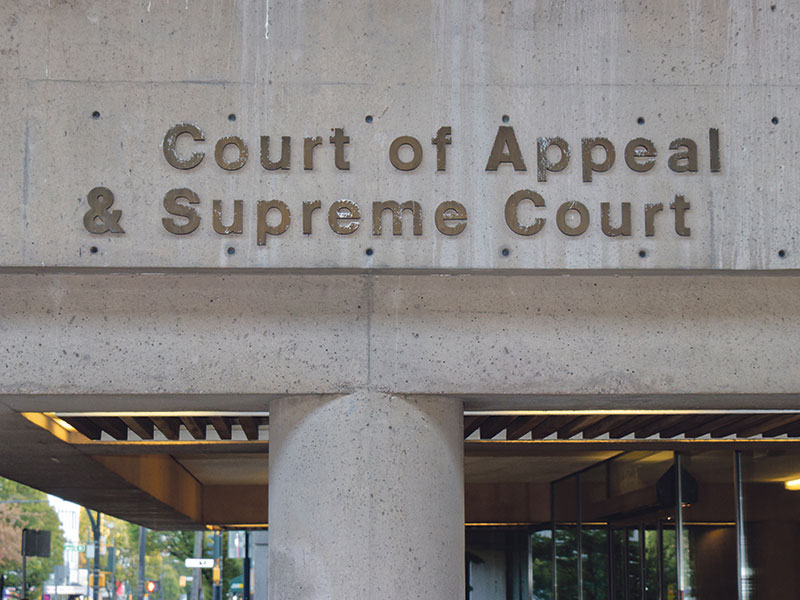
This article appears in the June 2023 issue of Investment Executive. Subscribe to the print edition, read the digital edition or read the articles online.
A recent supreme court of British Columbia decision considered the question of what happens when a spouse with a life interest in an estate outlives the beneficiaries.
In Bradley Estate (2023 BCSC 618), the deceased’s children — the remainder beneficiaries of their father’s estate — predeceased the deceased’s second wife, who died at the age of 103, creating uncertainty as to who should receive her interest.
George Bradley Sr. died in 1979, leaving his wife, Marion; two adult children, Carson and Marilyn; and several grandchildren.
George’s will, written a month before he died, directed executors and trustees to set up a trust to hold the residence the couple shared for Marion’s benefit during her life, and to create two other trusts:one to hold 45% of the remainder of the estate for the benefit of Carson and Marilyn (termed in the will as “the Children’s Share”), and the other to hold 55% of the remainder of the estate for Marion (termed “the Wife’s Share”).
A subclause in the will directed the executors and trustees to distribute the remainder of “the Wife’s Share” upon Marion’s death to “my issue then alive”:60% to Marilyn and 40% to Carson.
Another subclause stated:“If either of my said daughter or son shall have died before such division and appropriation, I direct that his or her share shall be paid and transferred to the survivor of them.” However, the will did not expressly address how “the Wife’s Share” was to be distributed if both children died before Marion.
In 2022, Marion died, having outlived both Carson, who died in 1999, and Marilyn, who died in 2016.
Marion’s executors were her sons from a previous marriage, Lawrence and Gordon. Lawrence also served as a trustee of George’s will and, in that capacity, asked the court for an interpretation of the will.
Meanwhile, Gordon, on behalf of Marion’s estate, contended that an intestacy existed as to “the Wife’s Share,” arguing that the wording “my issue then alive” in George’s will could refer only to Carson and Marilyn, and that George had intended the division of “the Wife’s Share” be determined at the time of Marion’s death. As Carson and Marilyn had predeceased Marion, Gordon argued, the remainder fell to intestacy, which would result in Marion’s estate receiving it.
While the court agreed with Gordon that “my issue” in this case meant Carson and Marilyn only, it disagreed with Gordon’s contention that an intestacy resulted.
Instead, the court found that the will’s subclause that provided for what would happen if one of the children predeceased Marion took priority over the subclause that governed the division of the remainder interest at the time of Marion’s death. As a result, the remainder interest went to Marilyn’s estate, not Marion’s.
“The whole of the remainder of the Wife’s Share, following the life estate, vested in Marilyn on Carson’s death in 1999, and nothing happened subsequently to divest it,” the court found. It also ruled there had been no intestacy related to the Children’s Share.
The decision in Bradley Estate highlights the importance of considering different scenarios for the sequence of death among beneficiaries when preparing a will, said Matthew Urback, estate lawyer and partner with Shibley Righton LLP in Toronto. Failing to do so could result in outcomes the testator hadn’t intended.
“[Clients] don’t like to consider people who are younger dying first, or death in general, but I think it’s helpful to set out [different scenarios],” Urback said. “Write out a family tree, if need be, that sets out what happens in scenario A, B, C and D, and go on and make sure you got them all.”
Bradley Estate also is “a great example” of a court interpreting a will to prevent an intestacy, Urback said. As the court stated, “If the will can be read in a manner that avoids an intestacy, that interpretation should be preferred because it may be presumed that the testator intended to die testate and not intestate, or they would not have made the will in the first place.”
Advisor chargebacks are bad for the industry
The CSA is considering a ban on the practice